人教新目标(Go for it)版八年级下册Unit 1 What's the matter? SectionA GF-4c(共35张PPT)
文档属性
| 名称 | 人教新目标(Go for it)版八年级下册Unit 1 What's the matter? SectionA GF-4c(共35张PPT) |
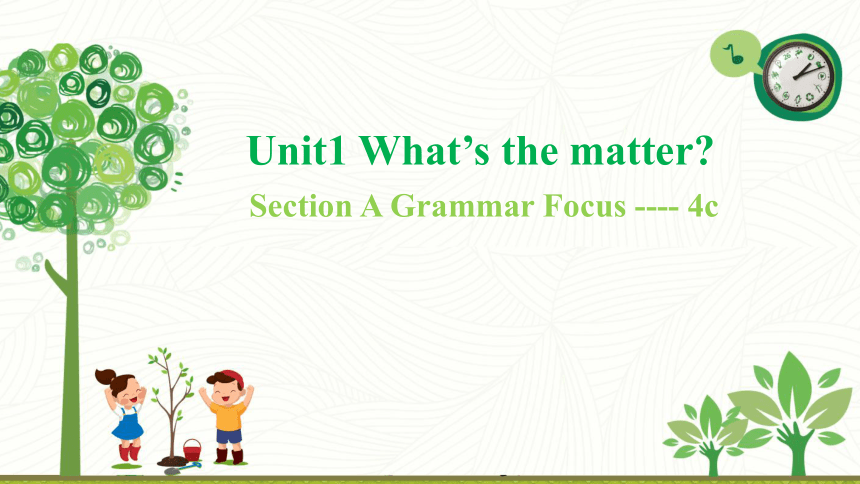
|
|
| 格式 | pptx | ||
| 文件大小 | 1.4MB | ||
| 资源类型 | 教案 | ||
| 版本资源 | 人教新目标(Go for it)版 | ||
| 科目 | 英语 | ||
| 更新时间 | 2024-02-21 16:17:59 | ||
图片预览

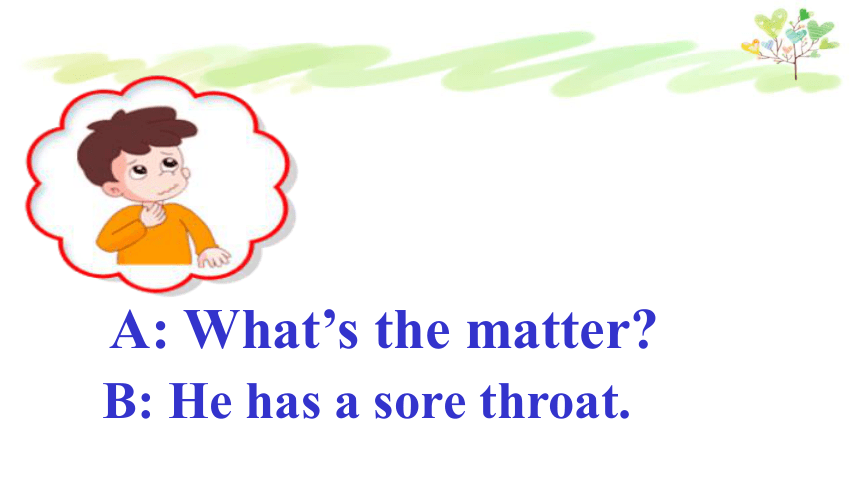
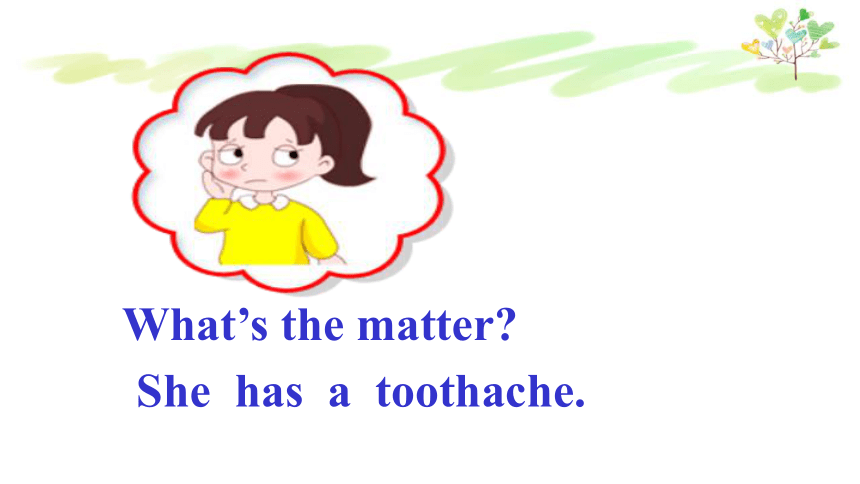
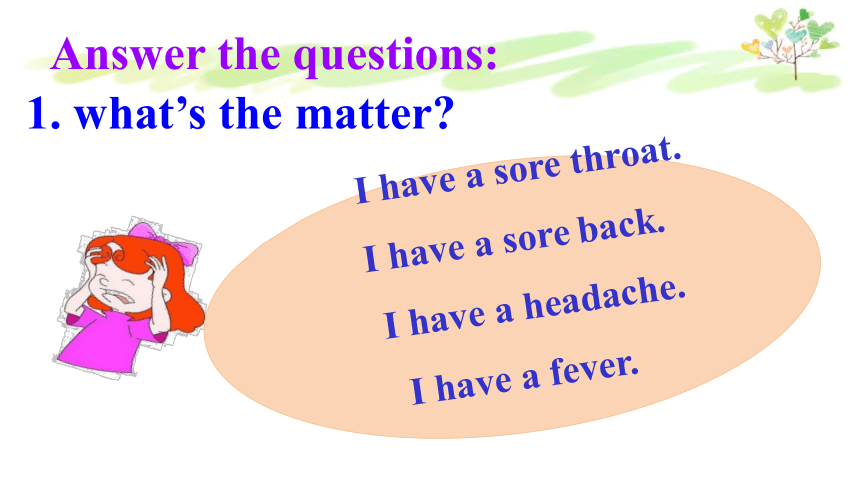
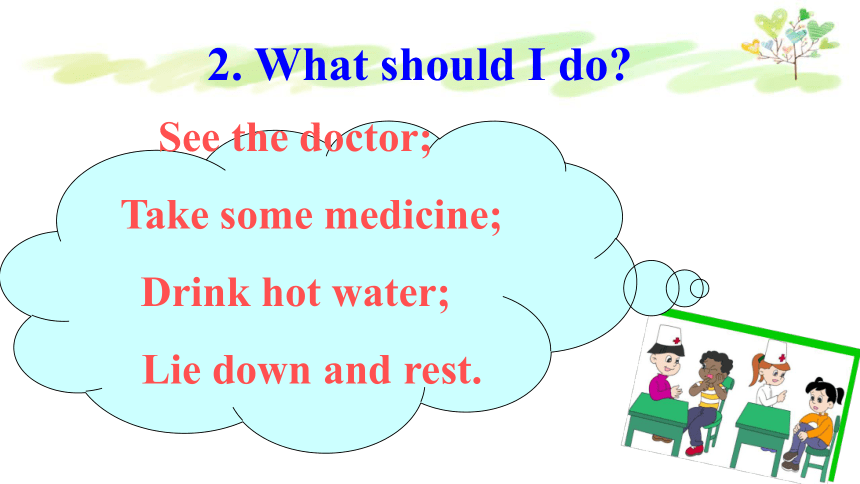


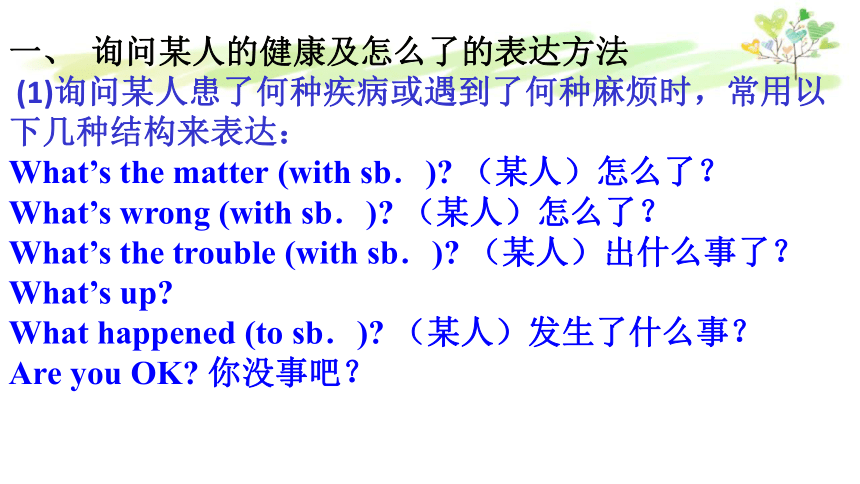
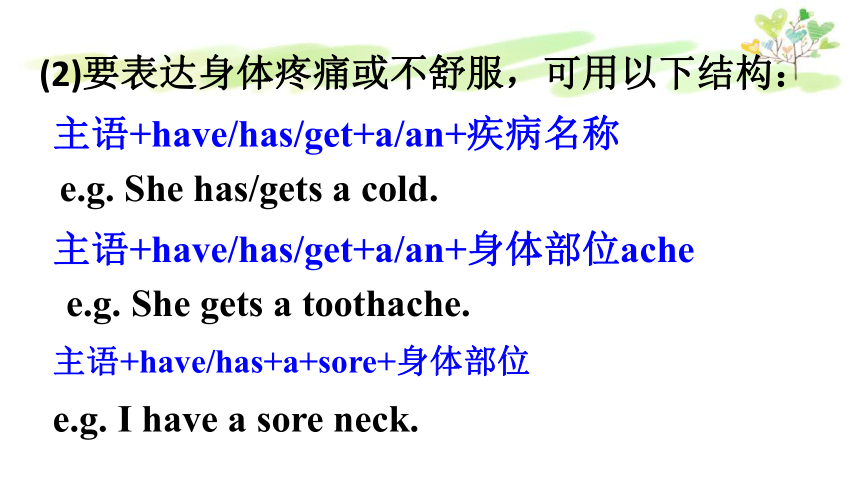
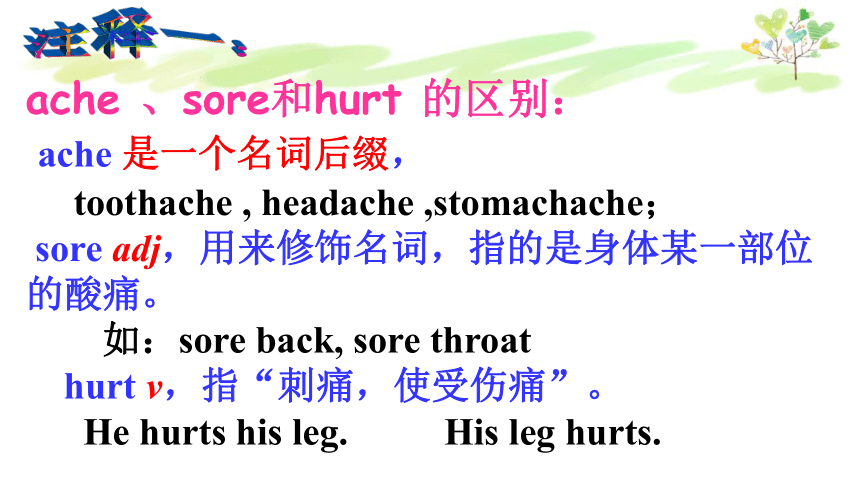
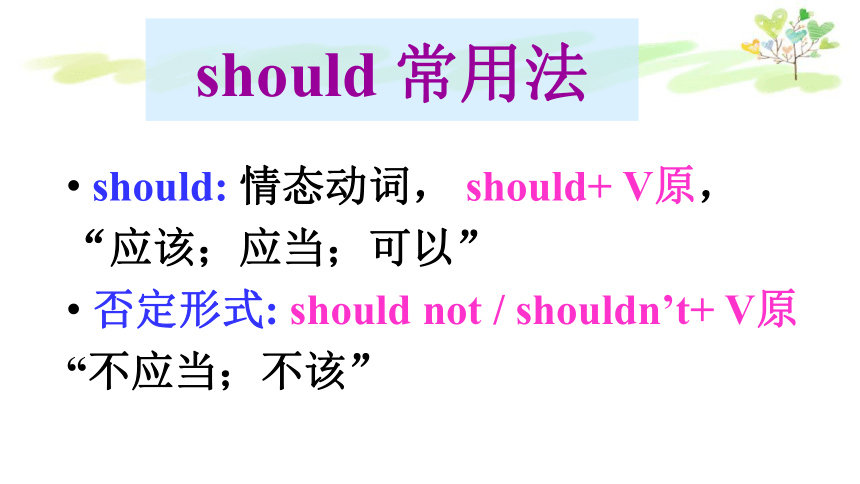
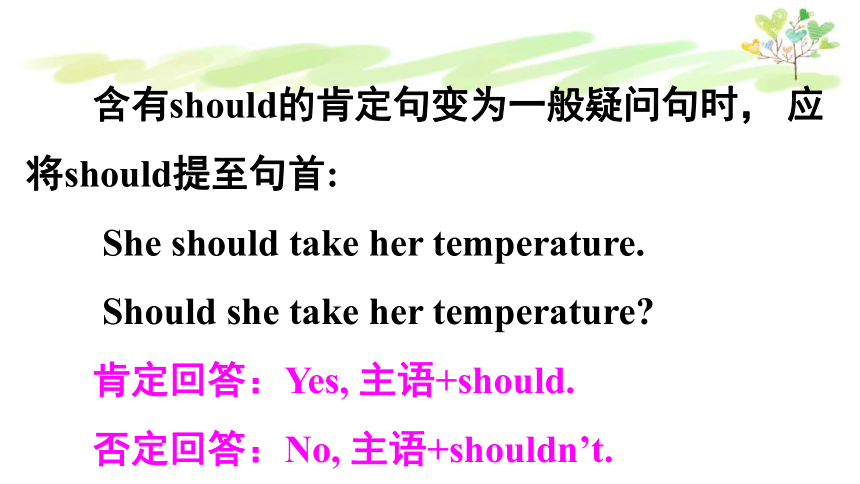
文档简介
(共35张PPT)
Unit1 What’s the matter
Section A Grammar Focus ---- 4c
A: What’s the matter
B: He has a sore throat.
She has a toothache.
What’s the matter
Answer the questions:
1. what’s the matter
I have a sore throat.
I have a sore back.
I have a headache.
I have a fever.
2. What should I do
See the doctor;
Take some medicine;
Drink hot water;
Lie down and rest.
have a bad cold
have a high fever
严重的感冒
发高烧
be in a fever
在发烧
拓展提高:
Grammar Focus
What’s the matter I have a stomachache. You shouldn’t eat so much next time.
What’s the matter with Ben He hurt himself. He has a sore back He should lie down and rest.
Do you have a fever Yes, I do./No, I don’t./I don’t know.
Does he have a toothache Yes, he does. He should see a dentist and get an X-ray.
What should she do She should take her temperature.
Should I put some medicine on it Yes, you should./No, you shouldn’t.
一、 询问某人的健康及怎么了的表达方法
(1)询问某人患了何种疾病或遇到了何种麻烦时,常用以下几种结构来表达:
What’s the matter (with sb.) (某人)怎么了?
What’s wrong (with sb.) (某人)怎么了?
What’s the trouble (with sb.) (某人)出什么事了?
What’s up
What happened (to sb.) (某人)发生了什么事?
Are you OK 你没事吧?
(2)要表达身体疼痛或不舒服,可用以下结构:
主语+have/has/get+a/an+疾病名称
e.g. She has/gets a cold.
主语+have/has+a+sore+身体部位
e.g. I have a sore neck.
主语+have/has/get+a/an+身体部位ache
e.g. She gets a toothache.
ache 、sore和hurt 的区别:
ache 是一个名词后缀,
toothache , headache ,stomachache;
sore adj,用来修饰名词,指的是身体某一部位的酸痛。
如:sore back, sore throat
hurt v,指“刺痛,使受伤痛”。
He hurts his leg. His leg hurts.
注释一:
should 常用法
should: 情态动词, should+ V原, “应该;应当;可以”
否定形式: should not / shouldn’t+ V原
“不应当;不该”
含有should的肯定句变为一般疑问句时, 应将should提至句首:
She should take her temperature.
Should she take her temperature
肯定回答:Yes, 主语+should.
否定回答:No, 主语+shouldn’t.
请根据健康问题用should给出恰当的建议。
1. Mike has a toothache.
2 One of my classmates has a cold.
3 Mary cut herself.
He should see a dentist.
He / She should go to a doctor.
She should put some medicine on the cut.
根据汉语意思完成下列句子。
1. 你应该按时完成作业。
You _______ ______ your homework on time.
2. 你不应该相信陌生人。
You ________ _______ strangers.
3. 我应该打开窗户吗?
______ ____ ______ the window
should finish
shouldn’t believe
Should I open
Practice
反身代词又称为自身代词,表示动作行为反射到行为执行者本身。它还可以在句中起到强调的作用,用以加强语气。
反身代词
英语中共有八个反身代词,在使用时应注意和它所指的相应的对象在人称、性别、数上保持一致。其基本形式如下表所示:
第一人称 第二人称 第三人称
单数 myself yourself himself
herself
itself
复数 ourselves yourselves themselves
粉墨登场
1. 可用作宾语,指的是宾语和主语表示同一个或同一些的人或事物。
e.g. Amy bought herself a car.
We must look after ourselves very well.
2. 可用作表语,指的是表语和主语表示同一个或同一些人或事物。
e.g. Just be yourself.
3. 可用作主语或宾语的同位语,常用来加强语气
e.g. Mrs Smith herself is a teacher.
You had better ask the driver himself.
4. 用在某些固定短语当中。
照顾自己
look after oneself / take care of oneself
自学
teach oneself sth./ learn sth. by oneself
玩得高兴,过得愉快
enjoy oneself
请自用……(随便吃/喝些……)
help oneself to sth.
反身代词用法口诀
反身代词表自身, 句中常作三成分。
动介后面用作宾, 表示动作回自身。
句中强调同位语, 主语宾语后面跟。
系动词后作表语, 这个用法要牢记
e.g. The children are enjoying herself in the park.
1.反身代词必须在与其所指代的名词或代词形成相互关系,在人称,性别和数上保持一致。
e.g. The children are enjoying themselves in the park.
易错点
2.反身代词不能单独做主语,但可以做主语的同位语,起强调作用。
如:我自己能完成作业。
(误) Myself can finish my homework.
(正) I myself can finish my homework. /
I can finish my homework myself.
3. 反身代词表示“某人自己”,不能表示“某人的东西”,因为它没有所有格的形式。表达“某人自己的(东西)”时,须要用one’s own+n
如:我用我自己的笔画画。
(误) I’m drawing with myself pen.
(正) I’m drawing with my own pen.
1. My classmate, Li Ming, made a card for_______ just now.
2. Bad luck! I cut _______ with a knife yesterday.
3. They tell us they can look after __________
very well.
4. My cat can find food by _____.
5. Help __________ to some beef, boys.
himself
myself
themselves
itself
yourselves
活学活用
4a
Fill in the blanks and practice the conversations.
1. A: I hurt ______ when I played basketball yesterday. What ______ I do
B: You ______ see a doctor and get an X-ray.
2. A: _______ the matter
B: My sister and I ____ sore throats. ______ we go to school
A: No, you _________.
myself
should
should
What’s
have
Should
shouldn’t
3. A: _____ Mike _____ a fever
B: No, he ________. He _____ a stomachache.
A: He _______ drink some hot tea.
Does
have
doesn’t
has
should
4b
Circle the best advice for these health problems. Then add your own advice.
Jenny cut herself.
She should (get an X-ray/
put some medicine on the cut).
My advice:
2. Kate has a toothache.
She should (see a dentist/get some sleep).
My advice:
She should…
She should …
3. Mary and Sue have colds.
They shouldn’t (sleep / exercise).
My advice:
4. Bob has a sore back.
He should (lie down and rest / take his temperature).
My advice:
They should …
He should …
4c
One student mimes a problem. The other students in your group guess the problem and give advice.
Name Problem Advice
Liu Peng fall down go home and rest
A: What’s the matter Did you hurt yourself
playing soccer
B: No, I didn’t.
C: Did you fall down
B: Yes, I did.
D: You should go home and get some rest.
Ⅰ. 根据句意及提示填空。
1. Sue made a cake ________(her) without her mother’s help.
2. Should we ________(join) the chess club or the swimming club
3. I think the farmer shouldn’t ________(save) that snake.
4. The two boys hurt __________(them) when playing soccer.
herself
join
save
themselves
Ⅱ. 根据括号内的要求完成下列各题。
1. I have a sore back. (改为一般疑问句)
_______ _______ _______ a sore back
2. —Does your sister have a headache (补全否定答语)
—No, _______ _______.
3. —Should I take Mary to see the doctor
(补全否定答语)
—No, _______ _________.
Do you have
she doesn’t
you shouldn’t
4. Ben’s brother should take singing lessons. (对划线部分提问)
_______ _______ Ben’s brother _______
5. Alice’s cousin has the flu. (对划线部分提问)
_______ _______ _______ _______ Alice’s cousin
What should do
What’s the matter with
Ⅲ. 完成英语句子,每空一词。
1. 你们要在哪儿下车?
Where will you _____ ______ the bus
2. 令我们惊讶的是,他们赢了这场棒球比赛。
______ ______ _______, they won the baseball game.
3. 格林先生要你马上去他的办公室见他。
Mr. Green asked you to see him in his office
______ ______.
get off
To our surprise
right away
Summary
should属情态动词, 后接动词原形, 没有人称和数的变化。用于提出建议劝告别人。
反身代词表示动作行为反射到行为执行者本身。在句中起到强调的作用,用以加强语气
询问他人健康可以说:
What’s the matter (with sb)?
Unit1 What’s the matter
Section A Grammar Focus ---- 4c
A: What’s the matter
B: He has a sore throat.
She has a toothache.
What’s the matter
Answer the questions:
1. what’s the matter
I have a sore throat.
I have a sore back.
I have a headache.
I have a fever.
2. What should I do
See the doctor;
Take some medicine;
Drink hot water;
Lie down and rest.
have a bad cold
have a high fever
严重的感冒
发高烧
be in a fever
在发烧
拓展提高:
Grammar Focus
What’s the matter I have a stomachache. You shouldn’t eat so much next time.
What’s the matter with Ben He hurt himself. He has a sore back He should lie down and rest.
Do you have a fever Yes, I do./No, I don’t./I don’t know.
Does he have a toothache Yes, he does. He should see a dentist and get an X-ray.
What should she do She should take her temperature.
Should I put some medicine on it Yes, you should./No, you shouldn’t.
一、 询问某人的健康及怎么了的表达方法
(1)询问某人患了何种疾病或遇到了何种麻烦时,常用以下几种结构来表达:
What’s the matter (with sb.) (某人)怎么了?
What’s wrong (with sb.) (某人)怎么了?
What’s the trouble (with sb.) (某人)出什么事了?
What’s up
What happened (to sb.) (某人)发生了什么事?
Are you OK 你没事吧?
(2)要表达身体疼痛或不舒服,可用以下结构:
主语+have/has/get+a/an+疾病名称
e.g. She has/gets a cold.
主语+have/has+a+sore+身体部位
e.g. I have a sore neck.
主语+have/has/get+a/an+身体部位ache
e.g. She gets a toothache.
ache 、sore和hurt 的区别:
ache 是一个名词后缀,
toothache , headache ,stomachache;
sore adj,用来修饰名词,指的是身体某一部位的酸痛。
如:sore back, sore throat
hurt v,指“刺痛,使受伤痛”。
He hurts his leg. His leg hurts.
注释一:
should 常用法
should: 情态动词, should+ V原, “应该;应当;可以”
否定形式: should not / shouldn’t+ V原
“不应当;不该”
含有should的肯定句变为一般疑问句时, 应将should提至句首:
She should take her temperature.
Should she take her temperature
肯定回答:Yes, 主语+should.
否定回答:No, 主语+shouldn’t.
请根据健康问题用should给出恰当的建议。
1. Mike has a toothache.
2 One of my classmates has a cold.
3 Mary cut herself.
He should see a dentist.
He / She should go to a doctor.
She should put some medicine on the cut.
根据汉语意思完成下列句子。
1. 你应该按时完成作业。
You _______ ______ your homework on time.
2. 你不应该相信陌生人。
You ________ _______ strangers.
3. 我应该打开窗户吗?
______ ____ ______ the window
should finish
shouldn’t believe
Should I open
Practice
反身代词又称为自身代词,表示动作行为反射到行为执行者本身。它还可以在句中起到强调的作用,用以加强语气。
反身代词
英语中共有八个反身代词,在使用时应注意和它所指的相应的对象在人称、性别、数上保持一致。其基本形式如下表所示:
第一人称 第二人称 第三人称
单数 myself yourself himself
herself
itself
复数 ourselves yourselves themselves
粉墨登场
1. 可用作宾语,指的是宾语和主语表示同一个或同一些的人或事物。
e.g. Amy bought herself a car.
We must look after ourselves very well.
2. 可用作表语,指的是表语和主语表示同一个或同一些人或事物。
e.g. Just be yourself.
3. 可用作主语或宾语的同位语,常用来加强语气
e.g. Mrs Smith herself is a teacher.
You had better ask the driver himself.
4. 用在某些固定短语当中。
照顾自己
look after oneself / take care of oneself
自学
teach oneself sth./ learn sth. by oneself
玩得高兴,过得愉快
enjoy oneself
请自用……(随便吃/喝些……)
help oneself to sth.
反身代词用法口诀
反身代词表自身, 句中常作三成分。
动介后面用作宾, 表示动作回自身。
句中强调同位语, 主语宾语后面跟。
系动词后作表语, 这个用法要牢记
e.g. The children are enjoying herself in the park.
1.反身代词必须在与其所指代的名词或代词形成相互关系,在人称,性别和数上保持一致。
e.g. The children are enjoying themselves in the park.
易错点
2.反身代词不能单独做主语,但可以做主语的同位语,起强调作用。
如:我自己能完成作业。
(误) Myself can finish my homework.
(正) I myself can finish my homework. /
I can finish my homework myself.
3. 反身代词表示“某人自己”,不能表示“某人的东西”,因为它没有所有格的形式。表达“某人自己的(东西)”时,须要用one’s own+n
如:我用我自己的笔画画。
(误) I’m drawing with myself pen.
(正) I’m drawing with my own pen.
1. My classmate, Li Ming, made a card for_______ just now.
2. Bad luck! I cut _______ with a knife yesterday.
3. They tell us they can look after __________
very well.
4. My cat can find food by _____.
5. Help __________ to some beef, boys.
himself
myself
themselves
itself
yourselves
活学活用
4a
Fill in the blanks and practice the conversations.
1. A: I hurt ______ when I played basketball yesterday. What ______ I do
B: You ______ see a doctor and get an X-ray.
2. A: _______ the matter
B: My sister and I ____ sore throats. ______ we go to school
A: No, you _________.
myself
should
should
What’s
have
Should
shouldn’t
3. A: _____ Mike _____ a fever
B: No, he ________. He _____ a stomachache.
A: He _______ drink some hot tea.
Does
have
doesn’t
has
should
4b
Circle the best advice for these health problems. Then add your own advice.
Jenny cut herself.
She should (get an X-ray/
put some medicine on the cut).
My advice:
2. Kate has a toothache.
She should (see a dentist/get some sleep).
My advice:
She should…
She should …
3. Mary and Sue have colds.
They shouldn’t (sleep / exercise).
My advice:
4. Bob has a sore back.
He should (lie down and rest / take his temperature).
My advice:
They should …
He should …
4c
One student mimes a problem. The other students in your group guess the problem and give advice.
Name Problem Advice
Liu Peng fall down go home and rest
A: What’s the matter Did you hurt yourself
playing soccer
B: No, I didn’t.
C: Did you fall down
B: Yes, I did.
D: You should go home and get some rest.
Ⅰ. 根据句意及提示填空。
1. Sue made a cake ________(her) without her mother’s help.
2. Should we ________(join) the chess club or the swimming club
3. I think the farmer shouldn’t ________(save) that snake.
4. The two boys hurt __________(them) when playing soccer.
herself
join
save
themselves
Ⅱ. 根据括号内的要求完成下列各题。
1. I have a sore back. (改为一般疑问句)
_______ _______ _______ a sore back
2. —Does your sister have a headache (补全否定答语)
—No, _______ _______.
3. —Should I take Mary to see the doctor
(补全否定答语)
—No, _______ _________.
Do you have
she doesn’t
you shouldn’t
4. Ben’s brother should take singing lessons. (对划线部分提问)
_______ _______ Ben’s brother _______
5. Alice’s cousin has the flu. (对划线部分提问)
_______ _______ _______ _______ Alice’s cousin
What should do
What’s the matter with
Ⅲ. 完成英语句子,每空一词。
1. 你们要在哪儿下车?
Where will you _____ ______ the bus
2. 令我们惊讶的是,他们赢了这场棒球比赛。
______ ______ _______, they won the baseball game.
3. 格林先生要你马上去他的办公室见他。
Mr. Green asked you to see him in his office
______ ______.
get off
To our surprise
right away
Summary
should属情态动词, 后接动词原形, 没有人称和数的变化。用于提出建议劝告别人。
反身代词表示动作行为反射到行为执行者本身。在句中起到强调的作用,用以加强语气
询问他人健康可以说:
What’s the matter (with sb)?
同课章节目录
- Unit 1 What's the matter?
- Section A
- Section B
- Unit 2 I'll help to clean up the city parks.
- Section A
- Section B
- Unit 3 Could you please clean your room?
- Section A
- Section B
- Unit 4 Why don't you talk to your parents?
- Section A
- Section B
- Unit 5 What were you doing when the rainstorm came
- Section A
- Section B
- Review of Units 1-5
- Unit 6 An old man tried to move the mountains.
- Section A
- Section B
- Unit 7 What's the highest mountain in the world?
- Section A
- Section B
- Unit 8 Have you read Treasure Island yet?
- Section A
- Section B
- Unit 9 Have you ever been to a museum?
- Section A
- Section B
- Unit 10 I've had this bike for three years.
- Section A
- Section B
